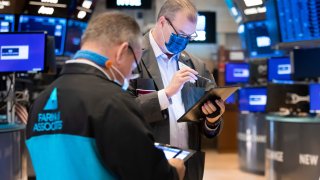
U.S. Treasury yields fell Tuesday after producer price inflation data came in as expected.
The yield on the benchmark 10-year Treasury note dropped 5.8 basis points to 1.439% by 4:10 p.m. ET. The yield on the 30-year Treasury bond gave up 6.6 basis points, falling to 1.822%. Yields move inversely to prices and 1 basis point is equal to 0.01%.
WATCH ANYTIME FOR FREE
Stream NBC10 Boston news for free, 24/7, wherever you are. |
Wholesale prices rose 8.6% from a year ago in October, their highest annual pace in records going back 10 years, the Labor Department said Tuesday.
October's producer price index, which is one measure of inflation that measures what companies get for the goods they produce, rose 0.6% from September, in line with Dow Jones estimates and an indicator that inflation pressures are continuing to pressure the U.S. economy.
Get updates on what's happening in Boston to your inbox. Sign up for our News Headlines newsletter.
Stripping out food, trade and energy prices, the index increased 0.4% month over month, slightly below the 0.5% estimate but an elevated pace from September's 0.1% gain. On a year-over-year basis, core producer prices increased 6.2%.
"Though there were no surprises with the PPI read, it could be viewed as somewhat of a disappointment in that inflation hasn't eased up in the slightest. And punctuated by the highest year over year number we've seen in a decade, there's no denying that pricing pressure looms large," said Mike Loewengart, managing director of investment strategy at E*Trade Financial.
"But with CPI on deck, investors may already have their sights set on any potential positive momentum from the read tomorrow."
Last month's consumer price index, which is more closely monitored by investors as a more direct measure of inflation, will be released at 8:30 a.m. ET on Wednesday. CPI is expected to show a 0.6% jump compared to the prior month.
Money Report
Inflation readings, along with the recovery in the labor market, are being watched by the Federal Reserve as it starts to pare back emergency economic stimulus measures. The central bank announced last week that it would start this process by reducing its bond-buying program by the end of November.
Raising interest rates would be the next step in the Fed's normalization of monetary policy.
Fed Vice Chairman Richard Clarida said on Monday that the central bank would be watching for continued rises in inflation, employment and gross domestic product.
"While we clearly are a ways away from considering raising interest rates, if the outlooks for inflation and unemployment … turn out to be the actual outcomes, then I do believe that these three conditions for raising the target range of the funds rate will have been met by year-end 2022," he said.
— CNBC's Maggie Fitzgerald, Pippa Stevens and Jeff Cox contributed to this market report.






